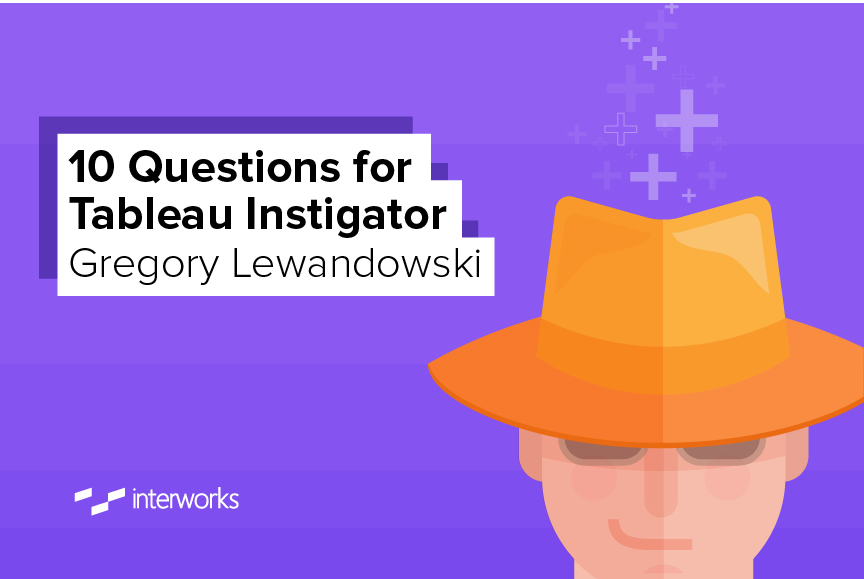10 Questions is an ongoing blog series in which Tableau Zen Master Dan Murray interviews some of the brightest folks in the world of data.

I met Gregory Lewandowski (aka @lewandog) at the second Tableau Customer Conference. He was wearing this gangster/jazzy fedora, and when I asked him were he got it his answer was that he “knew a guy.” Gregory comes from big-company technology. He works at Cisco and knows how to get things done inside of a big global hierarchy. We periodically chat on the phone about industry trends in BI. Greg’s view of the market is insightful.
The Questions
Q: You were an early adopter of Tableau coming from an unusual place: finance. Explain that, Greg. Why Tableau?
Lewandowski: I have some finance background, but my start with Tableau came from my time in channels operations. Though either may seem like unlikely places to begin with Tableau, channel operations was within a functional area that focuses on sales.
This group enabled me to focus on providing flexible data exploration to develop effective ways of communicating data more efficiently. The leader I worked for at the time remains one of my favorite people. He was a risk-taker and a very direct communicator who taught me an incredible amount about focusing on the customer and what is truly important. My results and the way in which I was able to communicate satisfied a multitude of unmet needs. The ability to do anticipate the next question and make changes on the fly was the icing on the cake.
Why Tableau? Speed and flexibility. I needed to move more quickly than traditional methodologies allowed and wanted the ability to design things in a way that would better meet the needs of our users. We evaluated over 30 BI tools. Some were discarded based on capabilities, others nixed because they required enterprise deployment or very technical resources to deploy. When I discovered this little, unknown company called Tableau, I knew I had found the product that was going to meet our needs.
Q: What was your first success you had with Tableau?
Lewandowski: Just before our annual partner conference in 2007, we were asked to provide briefing packets for our executives in preparation for partner meetings. The data was available, so we whipped up a dashboard providing the information in just a few hours. Hundreds of discussions with our most important partners were conducted during the conference. Meetings were approached with more knowledge about the partner, backed up with solid data.
Q: How do you think accounting teams could and should be using Tableau?
Lewandowski: There are many ways in which accounting could benefit. Imagine P&L’s at a partner, customer, region or country level. Think about a balance sheet that allows you to focus on a specific part of your business or model out future scenarios. Each of these are powerful for understanding and running a business, yet they remain a challenge in many companies. I am waiting for somebody (other than Tableau) to run their quarterly conference call with Tableau rather than the traditional PowerPoint slides 🙂
Q: From a financial perspective, why is Tableau a good investment?
Lewandowski: Productivity! We are all asked to do more with less, especially during challenging times. Tableau provides a tangible (nearly immediate) increase in productivity. Data preparation still requires 75% to 85% of your time, but Tableau is beginning to improve this part of the analysis cycle.
Q: For someone that has no understanding of database schema, what technical learning would help a non-technical person get the most out of Tableau?
Lewandowski: There are two things:
- Tableau likes data long, not wide. We often see data that has been pivoted or designed for consumption. Data sets have multiple columns for some category or time frame. The user experience with Tableau will be much better if you can get to the actual source behind the pivot and re-architect it into a better form.
- Basic joins. Tableau has a three-minute video that provides a good foundation.
Q: How has Tableau changed the way you approach analysis?
Lewandowski: Historically, BI and analysis was done by asking the customer what they want and how they want to see it by taking an order for a deliverable. Using Tableau allows me to focus on what my customers are trying to do with their data, what questions they are trying to answer and why, and what keeps them up at night. The ability to get someone to articulate questions that they had not thought of before is transformational. Leading someone down that path is incredibly gratifying.
Q: Who has influenced your thinking on Tableau or provided good learning examples? What people or sites do you monitor regarding data visualization?
Lewandowski: Many of the Tableau Zen Masters are on my list. Please forgive me, this is not an exhaustive list:
- Dan Murray is at the top of my list :). With each conversation we have, I come away with a wealth of knowledge and things to think about. Usually none of them have to do with Tableau; instead they’re about vision, various approaches, business models or personal things to aid in my success.
- Chuck Hooper — The Chuck-Father. The man who has forgotten more about this industry than most will ever know. Chuck has shown me that you can keep your soul and still succeed. I’m still sorry about the beer that I spilled on his head in San Diego.
- Ryan Robitaille — Though he might look intimidating, his casual confidence and “get things done” attitude will forever guide me.
- Anya A’Hearn and Kelly Martin — They have shown me that DataViz can be beautiful. They are some of the most creative folks out there.
- Ramon Martinez — His work always elicits a visceral reaction from me. His hallmarks are data density with attention to detail, clarity of story and work that truly matters to the world.
- Jonathon Drummey and Joe Mako — They are my inspirations when I think that something cannot be done. As Joe says, “If you can dream, we can do it.”
- Andy Kriebel — Whose tireless efforts to educate the masses on Tableau and data viz are appreciated by so many!
- Matt Francis — Whose antics bring the entire Tableau community together. I still laugh about the Hitler video. 🙂
Others:
- Andy Cotgreave — His work is always approachable
- Stephen Few — For providing the basis and ongoing support of my data viz education.
- Elissa Fink and Kelly Wright — Whose passion and drive on the topic of Tableau have aided in creating this brand new category.
- Anyone who says we can’t do it with Tableau — The world of BI has changed, and those people on the edges, those who are closer to the data and the customers are leading the charge. Many companies have been dragged kicking and screaming into this new world, regardless of those who think it cannot be done.
Q: What new capabilities do you want to see added to Tableau into the Desktop and Server products?
Lewandowski:
- More analytics — I envision a time when Tableau can analyze data and provide advanced model recommendation as well as a simple way to describe the models.
- More personal ETL — Data preparation still remains the most mind-numbing and time-consuming part of the analytics process. Wouldn’t it be great if the Version 9.0 features continued to expand, allowing us all to quickly and easily prepare any data?
- More server collaboration — Right now, when people talk about collaboration, they tend to think about synchronous and asynchronous collaboration, meaning being able to work on a viz together or by taking turns. What if we started to think about it a little differently and created a “workbench” type environment to provide hand-offs, tracking of time and work, and simple sharing of color palettes, shape files, calculations and templates?
- More control over dashboarding features — This is mostly related to consistency of the visual as well as attention to detail in the distribution of your worksheet tiles and the ability to place them precisely. I think it should be more of a workflow AND a working-together scenario.
- Add the color white to the color palettes.
- The ability to clear out a license history — In the enterprise, people come and go, often without de-activating their license. We need the ability to clear the history rather than go through a multi-day, multi-step process with customer service.
Q: You have been to many Tableau Conferences. Why should people attend?
Lewandowski: Sooooo many reasons:
- It’s in Vegas!
- The food is always great!
- Access to Tableau’s executives and developers … they do listen!
- Christian Chabot’s keynote is always inspiring and motivates me for the entire year.
- Customer stories — Seeing and hearing about the journey that others have taken will provide you with ideas and insights to put into motion upon your return to work.
- The people — Long lasting relationships are created amongst people of like minds, and at the Tableau Conference, you are surrounded by data and visualization wonks! This is my #1 reason for attending.
- Education — Regardless of your level of expertise, you will learn more at the conference than you would in 100 hours of study.
- Iron Viz — It is one of the most entertaining events. How would you like your work being scrutinized by hundreds of data viz experts in real time?
- Did I mention that it’s in Vegas!
Q: What other data or data visualization conferences do you think would be valuable to Tableau users?
Lewandowski: Gartner and the TDWI Executive Summit are my recommendations. The Tableau Conference is about Tableau. These others provide an understanding of the entire industry and aid you in understanding all of the data challenges faced by your company. They also give a glimpse into the direction of the market.
Discover More Interviews
Want to read more insightful interviews like this one? Then you’ll love our 10 Questions blog series. Check out the full list of interviews here, and stay tuned for new additions.
Need Help? Let Us Know!
There you have it. If you need help with your data infrastructure or Tableau, we have the experience, skill, and knowledge to insure your success. Contact us today to learn more.
If you’re in college and think you might want to get into this game, head to our Careers page and apply for one of our open jobs. We’d love to hear from you.

